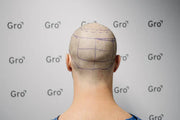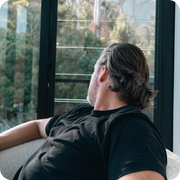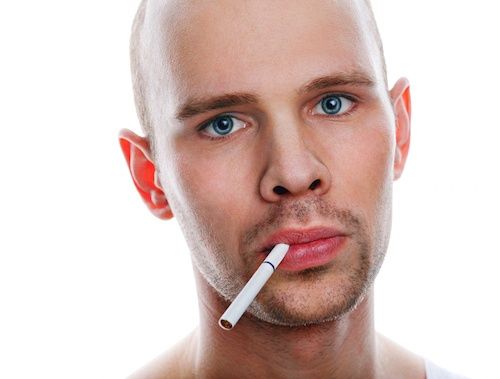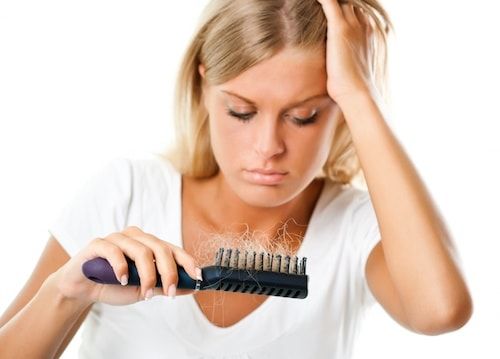
Will wearing a hat too much suffocate your hair? Does wearing a hat make you go bald? Will too much stress make you go bald? Will not enough sleep make your hair go brittle? How can we sort the fact from the fiction when it comes to myths and facts around hair loss?
If you suffer from hair loss, answer these 3 questions to discover the best treatment option for you.
Why do we have so many myths about hair loss?
I guess no one really wants to believe that it’s an ageing process or that there’s going to be a permanent disorder. Everyone hopes that it can be something simple that can be easily corrected.
It’s not just men is it, women also suffer from hair loss. Are there the same or different reasons between men and women losing hair?
With 90% of men that we see, most of it would be genetic and about 65% to 70% for females. A lot of females are pre-menopausal if they start losing hair at a young age. Generally, men can start losing hair from puberty if they are predisposed to balding. 80% of men start losing hair by the age of 50.
Myth Busting
If your mother’s father was bald, it’s an indicator that you will go bald.
It can be an indicator but balding is a dominant gene in men so it can come from either parent. So if your dad loses hair, there is a minimum 50% chance that you will lose hair, and if your mother’s father loses hair, minimum 25% chance that you will lose hair.
Wearing a tightly fit hat all the time is bad for your hair.
No, not really. Ideally, we need vitamin D, the hair responds well to the sun, but realistically the hat will not cause hair loss. If you were suffering a scalp condition, it would aggravate that, potentially accelerating the hair loss.
Using a hair dryer everyday is bad for hair loss.
Hair is a dead tissue so once it leaves your scalp you’ve got to look after it. The more you damage it, the only way to fix it is to repair it or chop it all off and start again, wait for it to regrow. Using a hairdryer won’t cause hair loss and it won’t accelerate hair loss, it will just physically make the hair dry and frizzy.
If you shave your hair off it will grow back thicker.
No, sadly, not going to happen. I think that’s an old myth from ladies shaving their legs and it grew back hairier. For people with hair loss, once it’s shaved it may grow back thinner by the time it does grow back. Shaving your head is the most cost effective form of treatment on the market, but keeping your hair is the most important part for young men, or anyone starting to lose hair.
What You Need To Know If You Are Losing Hair
The most important point is to seek advice on the right hair loss treatment based on your hair loss. The best place to start is by answering the three questions about your hair loss. Click on the “Get Started” button below and take action today.
Is stress a major factor?
Yes, stress the most well-known aggravate to hair loss and it will accelerate a pre-existing condition such as genetics.
Any other lifestyle factors?
Yes, poor diet, diabetes, lifestyle choices and any vices such as alcohol or any kind of heavy medications are potential accelerants. Thyroid conditions and blood sugar issues can cause overall thinning of the scalp.
Do you treat male and female hair loss the same?
With men, it’s quite an easy process to control these days. Stabilising and prevention of further thinning is becoming a lot easier as we understand hair loss a lot better now. So the goal is, for a young man, to get in early and you never have to go bald. For ladies, it’s isolating the initial cause. Post child-birth can trigger hair loss, menopause, polycystic ovarian syndrome, endometriosis, there are so many hormonal-based conditions that can cause hair loss in females. Females need to be treated differently.
So, the best thing to do once you identify the problem is to get onto it fairly quickly.
Yes, absolutely.
If someone hasn’t done that, and it’s a bit further down the path, is there much you can do?
The technology is such now that a hair transplant is one of the few cosmetic procedures that will leave no tell-tail signs that you’ve had a procedure done. It’s a form of micro procedure these days so we can actually re-build a hairline. For most people, it can be done in a single day and it’s a one-off procedure.
I presume the technology has improved over recent years?
Yes, and it’s getting better. Everybody asks, “What’s the downfall?” The only drawback is that the procedure itself takes a whole day. So instead of 4 or 5 hours, it can go as long as 8, 9 or 10 hours in some cases if you have to re-build a full head of hair. But, there’s less pain, there’s less discomfort, there’s less time off work. The technology is astounding now with regenerative medicine now, we’ve got guys back to work in 4 days.
Is there any pain involved?
No. Your first injection will feel like a little bit of a bee sting then that’s it. Then that’s it, there’s no discomfort.
What age is typical for someone who is going to experience hair loss, for that process to begin?
At least by mid-20’s. My youngest clients are coming in at 15 and 16 with quite advanced forms of male pattern baldness. Other clients in their late 40’s and 50’s who are only just starting to experience hair loss. By mid 20’s generally for most.
Are there differences as to where people are losing their hair?
Yes, there are multiple stages of male pattern baldness. So on the scale of baldness, there are quite a few different versions of hair loss. Bi-temporary or recession is the most common one we deal with. That’s when both temples recede together, then followed obviously by crownal thinning.
So what would be the process if someone was to go to you for their initial consultation, what would happen?
First thing is to assess exactly what’s going on and how advanced it’s become. The best way is to stabilise it. The first thing we talk about is, “Don’t lose any more.” Keep what you’ve got and make sure what you’ve got is going to last you for the rest of your life.
Then we talk about how we can correct the areas that need to be corrected, if there’s non-surgical methods available, or if a non-surgical method would give us the best result.
What do you do to preserve the hair that they have currently got?
It’s all about controlling a hormone that our body produces. Luckily, we produce it in very small quantities. So the treatments available only need to suppress a very small amount of this hormone. There are prescription medications for it, but there is also a natural alternative these days as well. People should be made aware of both options because it is a long-term treatment. You’ve got to be comfortable with what you’re going to use.
Is it possible to have hair naturally re-grow in an area where it has stopped growing?
Depending on the initial cause. If it was genetic, no, but for non-genetic factors, then definitely yes.
Next Step
If you suffer from hair loss, answer these 3 questions to discover the best treatment option for you.
At Gro, our treatment options are personalised to individual requirements, based on sound medical knowledge and experience. If you are worried about losing your hair, or have been thinking about getting treatment for hair loss, come in for a consultation. We can give you an accurate diagnosis and answer any questions you have about what treatment options are right for you.
For more information, you can visit a Gro clinic in Sydney, Brisbane or Melbourne, or Gold Coast, online hair loss clinic or call 1300 787 563.













